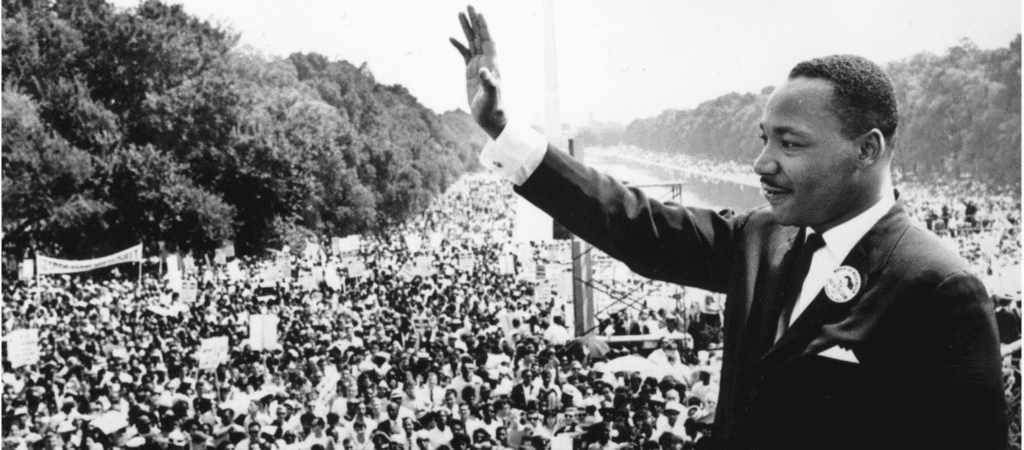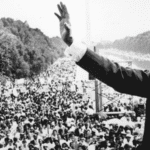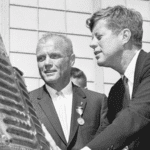The 1960s were a pivotal decade in American history, marked by significant social upheaval and the struggle for civil rights. At the forefront of this era was the Civil Rights Movement, which sought to eradicate systemic racial injustices that had persisted for centuries. The assassination of President John F. Kennedy in 1963 and the ongoing conflicts over racial segregation further underscored the urgency for change. Activists, many influenced by the teachings of Mahatma Gandhi and pursuing nonviolent resistance, fiercely challenged segregation laws and discriminatory practices that affected African Americans, particularly in the southern states.
In this tumultuous climate, the March on Washington for Jobs and Freedom on August 28, 1963, served as a remarkable platform for civil rights leaders to advocate for racial equality, economic justice, and legislation to address these injustices. Approximately 250,000 people gathered at the Lincoln Memorial, a testament to the movement’s growing momentum. It was here that Martin Luther King Jr. delivered his iconic ‘I Have a Dream’ speech, a powerful articulation of the aspirations of those who yearned for a nation where justice and equality would transcend race.
The significance of this event cannot be understated. Not only did it unify diverse groups advocating for civil rights, but it also garnered national and international attention, forcing the United States to confront its deep-seated racial issues. King’s life leading up to this moment was characterized by his commitment to nonviolent activism and his ability to inspire others through eloquent speech. His leadership and vision of a united America, free from the chains of racism, stirred the conscience of a divided nation and became a catalyst for future legislation, including the Civil Rights Act of 1964 and the Voting Rights Act of 1965. The impact of the speech echoes through history, reflecting the enduring legacy of King’s dream of equality and justice for all.
Key Themes and Messages in ‘I Have a Dream’
Martin Luther King Jr.’s ‘I Have a Dream’ speech is an enduring text that encapsulates essential themes pivotal to the Civil Rights Movement. At its core lies a profound vision of racial equality, where King fervently advocates for a world devoid of discrimination and prejudice. He articulates a dream where individuals are judged not by the color of their skin but by the content of their character. This vision resonates deeply with the American ethos of equality and justice, positioning King’s message as a universal call to action against the injustices that plague society.
Moreover, the importance of nonviolence emerges as a significant theme throughout King’s address. He firmly believed that peaceful resistance was the most effective means to achieve social change. King’s rhetoric emphasizes that through unity and nonviolent methods, oppressed communities could confront systemic injustice. This message is especially relevant in times of civil unrest, demonstrating that compassion and understanding are powerful tools for progress.
The quest for justice is another pivotal theme threaded through the speech. King articulates the urgency of addressing economic disparities and social injustices faced by African Americans. He uses evocative metaphors, such as the “bad check” metaphor, to illustrate how America had failed to fulfill its promise of liberty and justice for all. By appealing to widely held American values such as freedom and democracy, King elevates the struggle for civil rights into a national moral imperative.
King’s strategic use of repetition reinforces these themes, allowing key phrases to resonate deeply with his audience. Through rhetorical devices that engage emotions, he crafts a speech that transcends its historical moment, continuing to inspire generations. The emotions evoked by King’s words have ensured that his message remains relevant, echoing the ongoing struggle for equality and justice in contemporary society.
The Immediate Impact of the Speech
Delivered during the historic March on Washington for Jobs and Freedom on August 28, 1963, Martin Luther King Jr.’s ‘I Have a Dream’ speech swiftly captured the hearts of millions and played a pivotal role in elevating the civil rights movement to national prominence. Its profound message of justice and equality resonated deeply within the historic crowd of over 250,000 participants and those who heard it via radio and television broadcasts. The immediate reception was overwhelmingly positive, with many attendees expressing feelings of hope and determination in the face of systemic racial inequality.
The speech not only galvanized support among civil rights activists but also drew the attention of political leaders and citizens across the nation. This newfound visibility resulted in an increased urgency to address issues of racial segregation and discrimination. The evocative imagery and powerful rhetoric employed by King served to mobilize a diverse coalition of supporters, including white moderates and labor unions, further amplifying the call for change. As a result, King’s words were instrumental in setting the stage for subsequent legislative efforts aimed at dismantling institutional racism.
The impact of ‘I Have a Dream’ was particularly evident in the passage of landmark legislation in the years following its delivery. The Civil Rights Act of 1964 and the Voting Rights Act of 1965 were direct outcomes of the momentum built by King’s speech and the broader civil rights movement it helped accelerate. Political leaders began to recognize that public sentiment had shifted, largely due to the eloquence and urgency of King’s message. Reactions from key figures of the time, including President Lyndon B. Johnson, emphasized the speech’s role in shaping the legislative agenda around civil rights, ultimately leading to significant social and political transformations.
Through its immediate impact, King’s ‘I Have a Dream’ speech has endured as a touchstone of the quest for racial equality and justice in America, highlighting the power of a single speech to alter the course of history.
The Lasting Legacy of ‘I Have a Dream’
Martin Luther King Jr.’s ‘I Have a Dream’ speech remains one of the most significant orations in American history, embodying the continuing struggle for racial justice and equality. Delivered on August 28, 1963, during the March on Washington, this iconic address articulated a vision of a harmonious society where color did not determine one’s rights or opportunities. The resonance of King’s words persists today, transcending his era and echoing throughout modern social justice movements, such as Black Lives Matter and various grassroots initiatives aiming to combat systemic racism.
The speech is frequently cited by contemporary activists, serving as a foundational touchstone for individuals and organizations seeking to address enduring issues of discrimination and social inequality. King’s call for unity and his articulation of a collective dream have inspired generations, instilling a sense of hope and urgency among advocates for change. This powerful message not only underscores the importance of direct action in confronting injustice but also reminds us of the interconnectedness of all struggles for human rights.
In American culture, ‘I Have a Dream’ holds an esteemed place, being commemorated in various forms—from educational curricula to public memorials. The National Mall in Washington D.C. features historical monuments honoring King, and the speech is preserved in text and recording, accessible to audiences worldwide. As society grapples with the implications of racism, inequality, and civil rights, King’s vision fosters dialogue about the ideals necessary for achieving true social equity. Whether in the form of protests, art, or literature, the ideals expressed by King continue to resonate, confirming their vital role in our ongoing pursuit of justice.
Today’s activists, inspired by King’s legacy, reflect on the urgency of his message and continually strive to bring the dream he envisioned closer to reality. By remembering and referencing his words, they affirm that the journey towards equality is not only historical but also vital for future generations.

Key Elements of The I Have a Dream Speech
What many people don’t realise is that this was not the speech that King was planning to make, his adviser and close confidant Wyatt Walker advised him “Don’t use the lines about “I have a dream,” It’s trite, it’s cliche. You’ve used it too many times already.”
In truth he was starting to lose the audience and the crowd was growing a little restless after a long day at the march. “I have a dream” was not in any of the notes King had and would probably not have been used if it wasn’t for his favourite gospel singer Mahalia Jackson. She was stood behind King on the podium and shouted to him “Tell them about the dream, Martin.” But he carried on with his prepared speech. She shouted again “Tell them about the dream” and finally he put his prepared speech to one side and the rest they say is history.
“Let us not wallow in the valley of despair, I say to you today, my friends.
So even though we face the difficulties of today and tomorrow, I still have a dream. It is a dream deeply rooted in the American dream. I have a dream that one day this nation will rise up and live out the true meaning of its creed: We hold these truths to be self-evident, that all men are created equal.
I have a dream that one day on the red hills of Georgia, the sons of former slaves and the sons of former slave owners will be able to sit down together at the table of brotherhood.
I have a dream that one day even the state of Mississippi, a state sweltering with the heat of injustice, sweltering with the heat of oppression will be transformed into an oasis of freedom and justice.
I have a dream that my four little children will one day live in a nation where they will not be judged by the color of their skin but by the content of their character.
I have a dream today.
I have a dream that one day down in Alabama with its vicious racists, with its governor having his lips dripping with the words of interposition and nullification, one day right down in Alabama little Black boys and Black girls will be able to join hands with little white boys and white girls as sisters and brothers.
I have a dream today.
I have a dream that one day every valley shall be exalted, every hill and mountain shall be made low, the rough places will be made plain, and the crooked places will be made straight, and the glory of the Lord shall be revealed, and all flesh shall see it together.
This is our hope. This is the faith that I go back to the South with. With this faith, we will be able to hew out of the mountain of despair a stone of hope. With this faith we will be able to transform the jangling discords of our nation into a beautiful symphony of brotherhood. With this faith we will be able to work together, to pray together, to struggle together, to go to jail together, to stand up for freedom together, knowing that we will be free one day.
This will be the day when all of God’s children will be able to sing with new meaning: My country, ’tis of thee, sweet land of liberty, of thee I sing. Land where my fathers died, land of the pilgrims’ pride, from every mountainside, let freedom ring.
And if America is to be a great nation, this must become true. And so let freedom ring from the prodigious hilltops of New Hampshire. Let freedom ring from the mighty mountains of New York. Let freedom ring from the heightening Alleghenies of Pennsylvania. Let freedom ring from the snowcapped Rockies of Colorado. Let freedom ring from the curvaceous slopes of California. But not only that, let freedom ring from Stone Mountain of Georgia. Let freedom ring from Lookout Mountain of Tennessee. Let freedom ring from every hill and molehill of Mississippi. From every mountainside, let freedom ring.
And when this happens, and when we allow freedom ring, when we let it ring from every village and every hamlet, from every state and every city, we will be able to speed up that day when all of God’s children, Black men and white men, Jews and Gentiles, Protestants and Catholics, will be able to join hands and sing in the words of the old Negro spiritual: Free at last. Free at last. Thank God almighty, we are free at last.This will be the day when all of God’s children will be able to sing with new meaning: My country, ’tis of thee, sweet land of liberty, of thee I sing. Land where my fathers died, land of the pilgrims’ pride, from every mountainside, let freedom ring.”
More Historical Quotes To Inspire You
- The Art Of War Quotes – Sun Tzu
 Introduction to The Art of War The Art of War is an ancient Chinese military treatise attributed to Sun Tzu, a military strategist and philosopher who is believed to have lived during the Eastern Zhou period of ancient China, around the 5th century BCE. This seminal work has transcended its original context and remains highly… Read more: The Art Of War Quotes – Sun Tzu
Introduction to The Art of War The Art of War is an ancient Chinese military treatise attributed to Sun Tzu, a military strategist and philosopher who is believed to have lived during the Eastern Zhou period of ancient China, around the 5th century BCE. This seminal work has transcended its original context and remains highly… Read more: The Art Of War Quotes – Sun Tzu - I Have A Dream – Martin Luther King
 Dr Martin Luther King’s I Have A Dream Speech is rightly recognised as a pivotal moment in The Civil Rights Movement. What is not widely known is that the I Have A Dream section was not in the speech he was meant to give.
Dr Martin Luther King’s I Have A Dream Speech is rightly recognised as a pivotal moment in The Civil Rights Movement. What is not widely known is that the I Have A Dream section was not in the speech he was meant to give. - JFK Famous Quotes
 John F. Kennedy, the 35th President of the United States, served from January 1961 until his untimely death in November 1963. His presidency is often remembered for its significant impact on American society, as well as for the pivotal historical events that unfolded during this period. Kennedy’s leadership style was characterized by a commitment to… Read more: JFK Famous Quotes
John F. Kennedy, the 35th President of the United States, served from January 1961 until his untimely death in November 1963. His presidency is often remembered for its significant impact on American society, as well as for the pivotal historical events that unfolded during this period. Kennedy’s leadership style was characterized by a commitment to… Read more: JFK Famous Quotes - William Shakespeare – Linguistic Genius
 William Shakespeare, often celebrated as the most prominent figures in English literature, made an indelible mark on the evolution of the English language. Born in 1564 amidst the Renaissance, a period of profound change and creativity, he contributed significantly to the literary and linguistic landscape of his time. The English language during Shakespeare’s lifetime was… Read more: William Shakespeare – Linguistic Genius
William Shakespeare, often celebrated as the most prominent figures in English literature, made an indelible mark on the evolution of the English language. Born in 1564 amidst the Renaissance, a period of profound change and creativity, he contributed significantly to the literary and linguistic landscape of his time. The English language during Shakespeare’s lifetime was… Read more: William Shakespeare – Linguistic Genius - Winston Churchill Famous Quotes
 Winston Churchill, a pivotal figure in modern history, is best recognized for his unparalleled roles as a British statesman and military leader. Born on November 30, 1874, at Blenheim Palace, into an aristocratic family, Churchill displayed early signs of fortitude and leadership. His political career spanned over five decades, during which he held numerous governmental… Read more: Winston Churchill Famous Quotes
Winston Churchill, a pivotal figure in modern history, is best recognized for his unparalleled roles as a British statesman and military leader. Born on November 30, 1874, at Blenheim Palace, into an aristocratic family, Churchill displayed early signs of fortitude and leadership. His political career spanned over five decades, during which he held numerous governmental… Read more: Winston Churchill Famous Quotes - Crossing the Rubicon: The Moment That Changed History
 The period leading up to Julius Caesar’s crossing of the Rubicon River in 49 BC was marked by significant political and social upheaval in Rome. The Roman Republic was experiencing profound tensions, primarily driven by power struggles between the Senate and prominent military leaders. Julius Caesar, having enjoyed great military success in Gaul, emerged as… Read more: Crossing the Rubicon: The Moment That Changed History
The period leading up to Julius Caesar’s crossing of the Rubicon River in 49 BC was marked by significant political and social upheaval in Rome. The Roman Republic was experiencing profound tensions, primarily driven by power struggles between the Senate and prominent military leaders. Julius Caesar, having enjoyed great military success in Gaul, emerged as… Read more: Crossing the Rubicon: The Moment That Changed History






